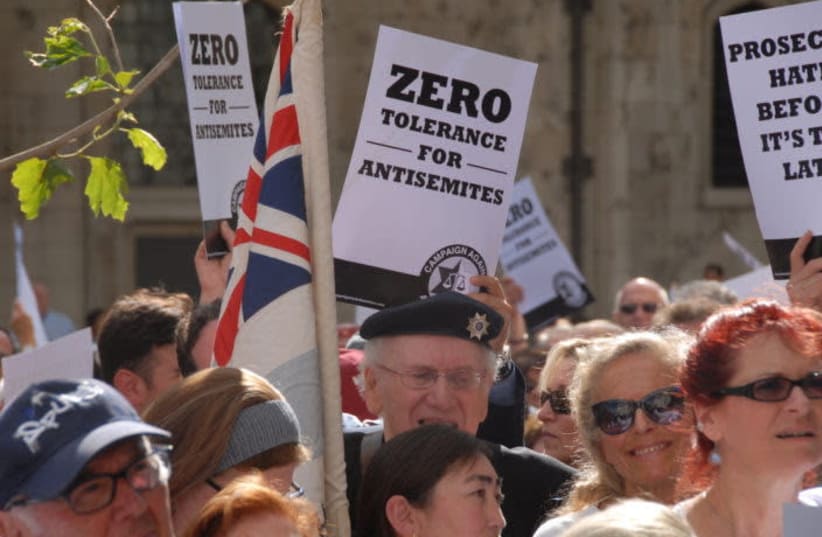The past few years have seen a rise in the number of violent anti-Israel protests within UK campuses with some requiring police intervention. Canceled guest talks by Israeli speakers have hit the news headlines prompting a public discussion about the threat to free-speech and rising levels of antisemitism within UK’s academia.
The atmosphere has become so poisonous that the Universities Minister Jo Johnson saw it right to address the representative bodies for higher education institutions and urge them to tackle “intimidation and violence” against Jewish students.
Referring to events taking place under the banner of Israel Apartheid Week, Johnson spoke of the need to prevent “our values, expectations and laws” from being violated.
Launched in 2005, Israel Apartheid Week (IAW) is a yearly series of events within campuses worldwide, pushing for a boycott of Israel and raising awareness to what organizers call “Israel’s settler-colonial project and apartheid system over the Palestinian people.”
It has attracted a number of high profile speakers (Ben White, Noam Chomsky) as well as a great deal of controversy. In 2016, Oxford University’s Labour Club co-chair Alex Chalmers resigned over the club’s endorsement of IAW and its “problem with Jews,” while this year’s University College London (UCL) talk by anti-Israel academic Azzam Tamimi has angered many.
The guest speaker has drawn criticism from UCL’s Friends of Israel Society who referred to Tamimi’s 2014 tweet which reads: “Is there one crime the #Nazis perpetrated that has not already been perpetrated by the #Zionists in #Palestine? Yet, #Gaza will win.”
Board of Deputies’ Vice President Amanda Bowman was quick to respond, citing Tamimi’s record of inciting hate against Jews, affiliation to Hamas and equating the actions of Israel with those of the Nazis as reasons for rejecting his talk.
To “appalled” Leeds MP Fabian Hamilton, IAW is a “campaign of hatred.”
“To link South African Apartheid to the creation of the state of Israel is outrageous,” Hamilton added, “and undermines both the struggle of the Jewish people as well as the possibility of a two-state solution.”
His sentiments are echoed by King’s College London Prof. Ed Byrne, who finds IAW “Abhorrent.” To Byrne, collaborations with Israel are a vital part of academic life and “part of our DNA at King’s.” It is Byne’s “passionate belief” that academic relationships with Israel are non-negotiable and “should be part of every university’s DNA.”
IAW’s campaign extends beyond the March week of action. It is part of a prevalent anti-Israel academic culture where Israeli voices are bluntly pushed away.
This includes speakers such as Israeli ambassador to Ireland Zeev Boker, whose 2017 talk at Trinity College Dublin was canceled due to security concerns. Forty members of Students for Justice in Palestine are reported to have forcibly barred access to the lecture theater where he was due to appear.
“To willfully shut down discussion before it has even begun is not, or should not be the way of universities,” reflected Trinity’s Provost Patrick Prendergast, but the question remains over Trinity’s ability to ensure that such a talk is not violently hijacked again, especially in light of the Trinity College Dublin Students’ Union vote to support a BDS campaign against the State of Israel.
On a different occasion, it was Ami Ayalon, former head of the Shin Bet (Israel security agency) and commander-in-chief of the navy, whose talk at King’s College London was turned violent by a pro-Palestinian group, culminating in the evacuation of the building and cancellation of the talk.
“Too many Israel Apartheid Weeks very quickly morph into antisemitic activity, violent activity and discrimination against Jewish students,” commented Baroness Ruth Deech. There is a feeling among Jewish students “that there are certain universities that you should avoid.”
It is abundantly clear that Israel Apartheid Week is reflective of a simmering anti-Israel university culture, which seems interwoven into campus life. The question on everyone’s lips is where the line is drawn between being anti-Israel and antisemitic.
To many Jewish students, the anti-Zionist campaign has crossed over that line, leaving them intimidated and vulnerable. Events such as Malia Bouattia’s 2016 election for National Union of Students president in spite of her Holocaust Memorial Day tweet reading “The shadow of the Holocaust continues to fall over us from the continuous Israeli occupation of Palestine to the election of Trump” only intensify these feelings and highlight the universities’ failure to protect freedom of speech. Other examples show Essex University rejecting the formation of a Jewish society, a lecturer at the university being suspended over antisemitic Facebook posts and UCL’s Student Union voting down a motion to adopt the IHRA definition of antisemitism.
Antisemitism “shouldn’t be defined by non-Jewish students,” J-Soc president Oliver Kingsley told The Jewish Chronicle. “The Islamic Society and the Friends of Palestine Societies got a massive turnout, so it was inevitable from the start we were going to lose.”
The argument from IHRA-opposers was that “because it links antisemitism to Israel, it would stop them from speaking out against Israel,” adds Kingsley, “but it doesn’t do that. It stops people from inviting speakers who say Zionists are Nazis, and my right to feel safe on campus shouldn’t be subordinate to others’ right to speak out against Israel.”
